基础英语3期末复习材料上课讲义
- 格式:doc
- 大小:98.50 KB
- 文档页数:10
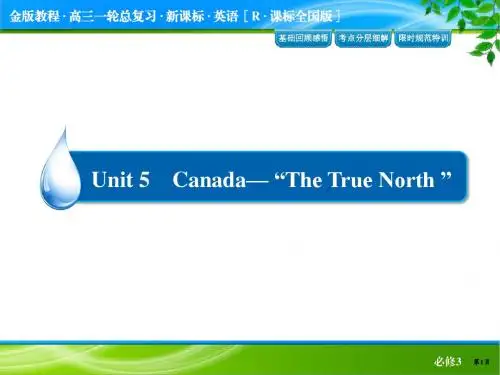

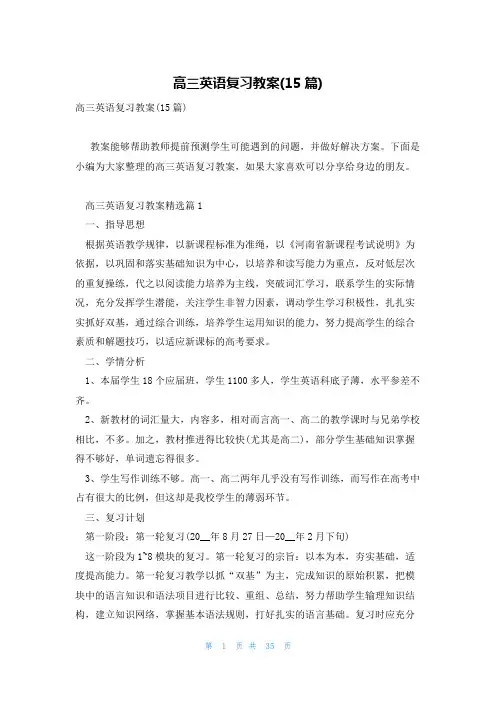
高三英语复习教案(15篇)高三英语复习教案(15篇)教案能够帮助教师提前预测学生可能遇到的问题,并做好解决方案。
下面是小编为大家整理的高三英语复习教案,如果大家喜欢可以分享给身边的朋友。
高三英语复习教案精选篇1一、指导思想根据英语教学规律,以新课程标准为准绳,以《河南省新课程考试说明》为依据,以巩固和落实基础知识为中心,以培养和读写能力为重点,反对低层次的重复操练,代之以阅读能力培养为主线,突破词汇学习,联系学生的实际情况,充分发挥学生潜能,关注学生非智力因素,调动学生学习积极性,扎扎实实抓好双基,通过综合训练,培养学生运用知识的能力,努力提高学生的综合素质和解题技巧,以适应新课标的高考要求。
二、学情分析1、本届学生18个应届班,学生1100多人,学生英语科底子薄,水平参差不齐。
2、新教材的词汇量大,内容多,相对而言高一、高二的教学课时与兄弟学校相比,不多。
加之,教材推进得比较快(尤其是高二),部分学生基础知识掌握得不够好,单词遗忘得很多。
3、学生写作训练不够。
高一、高二两年几乎没有写作训练,而写作在高考中占有很大的比例,但这却是我校学生的薄弱环节。
三、复习计划第一阶段:第一轮复习(20__年8月27日—20__年2月下旬)这一阶段为1~8模块的复习。
第一轮复习的宗旨:以本为本,夯实基础,适度提高能力。
第一轮复习教学以抓“双基”为主,完成知识的原始积累,把模块中的语言知识和语法项目进行比较、重组、总结,努力帮助学生输理知识结构,建立知识网络,掌握基本语法规则,打好扎实的语言基础。
复习时应充分发挥学生的主体作用。
精选一轮复习资料,一单元一案,每单元4x5课时,每周一次拓展练习。
注重阅读训练,2—3篇/日;强化书面表达训练,1篇/周(25分钟左右);书面表达常用的词、短语、句子记录背诵。
每天有一定量的词汇要求学生记忆,保证学生早、晚每次10分钟,重复记忆(要背诵的词、短语、句子列在平时的练习中)。
计划至20__年2月下旬结束第一轮复习。
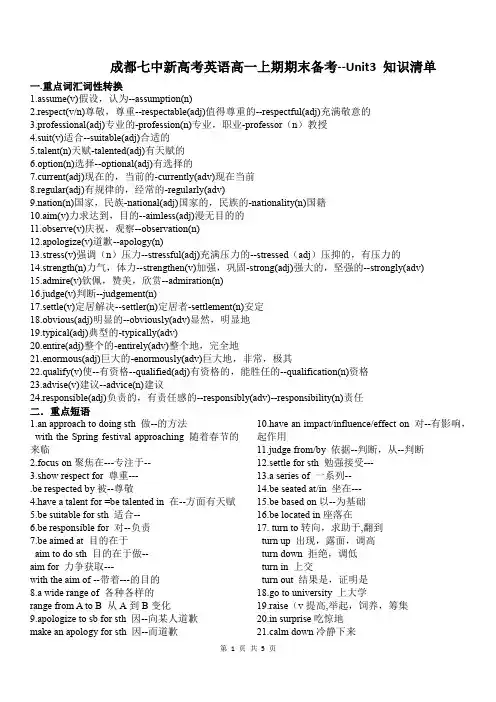
成都七中新高考英语高一上期期末备考--Unit3 知识清单一.重点词汇词性转换1.assume(v)假设,认为--assumption(n)2.respect(v/n)尊敬,尊重--respectable(adj)值得尊重的--respectful(adj)充满敬意的3.professional(adj)专业的-profession(n)专业,职业-professor(n)教授4.suit(v)适合--suitable(adj)合适的5.talent(n)天赋-talented(adj)有天赋的6.option(n)选择--optional(adj)有选择的7.current(adj)现在的,当前的-currently(adv)现在当前8.regular(adj)有规律的,经常的-regularly(adv)9.nation(n)国家,民族-national(adj)国家的,民族的-nationality(n)国籍10.aim(v)力求达到,目的--aimless(adj)漫无目的的11.observe(v)庆祝,观察--observation(n)12.apologize(v)道歉--apology(n)13.stress(v)强调(n)压力--stressful(adj)充满压力的--stressed(adj)压抑的,有压力的14.strength(n)力气,体力--strengthen(v)加强,巩固-strong(adj)强大的,坚强的--strongly(adv)15.admire(v)钦佩,赞美,欣赏--admiration(n)16.judge(v)判断--judgement(n)17.settle(v)定居解决--settler(n)定居者-settlement(n)安定18.obvious(adj)明显的--obviously(adv)显然,明显地19.typical(adj)典型的-typically(adv)20.entire(adj)整个的-entirely(adv)整个地,完全地21.enormous(adj)巨大的-enormously(adv)巨大地,非常,极其22.qualify(v)使--有资格--qualified(adj)有资格的,能胜任的--qualification(n)资格23.advise(v)建议--advice(n)建议24.responsible(adj)负责的,有责任感的--responsibly(adv)--responsibility(n)责任二.重点短语1.an approach to doing sth 做--的方法with the Spring festival approaching 随着春节的来临2.focus on聚焦在---专注于--3.show respect for 尊重---.be respected by被--尊敬4.have a talent for =be talented in 在--方面有天赋5.be suitable for sth 适合--6.be responsible for 对--负责7.be aimed at 目的在于aim to do sth 目的在于做--aim for 力争获取---with the aim of --带着---的目的8.a wide range of 各种各样的range from A to B 从A到B变化9.apologize to sb for sth 因--向某人道歉make an apology for sth 因--而道歉10.have an impact/influence/effect on 对--有影响,起作用11.judge from/by 依据--判断,从--判断12.settle for sth 勉强接受---13.a series of 一系列--14.be seated at/in 坐在---15.be based on以--为基础16.be located in座落在17. turn to转向,求助于,翻到turn up 出现,露面,调高turn down 拒绝,调低turn in 上交turn out 结果是,证明是18.go to university 上大学19.raise(v提高,举起,饲养,筹集20.in surprise吃惊地21.calm down冷静下来22.stop doing停止做某事stop to do 停下来做某事23.advise sb to do sth建议某人做某事24.be proud of 因--而骄傲=take pride in25.take my advice采纳我的建议26.jump in 草率投入27..at the same time 同时28.hear from sb 收到某人的来信29.can’t wait to do sth 迫不及待做某事30.in one’s thirties 在某人三十多岁时31.be busy with sth 忙于--be busy doing 忙于32.make up for 弥补33.most importantly 最重要的是。

英语语法基础辅导讲义第一章:英文文法的最基本规则第一章英文文法的最基本规则英文和我们中文最大的不同,是在动词,我们中文的动词很简单,没有所谓的第几人称,也没有复数和单数之分,更没有过去式或进行式,英文可不同了,凡是用动词的时候,必须注意很多很多的规则,一旦弄错了,常常是犯了大错。
在这一章,我要将英文最基本的规则一一列下。
这些规则都是我们中国人所常常不注意的。
为了不要误导读者,凡本书内错误的句子前面都有〝*〞的符号。
规则(1):两个动词是不能联在一起用的。
在中文,我们常说“我是爱你的”,翻成英文,这就变成了*I am love you.滑稽的是,这句英文句子犯了大忌,因为〝am〞是动词,〝love〞也是动词,两个动词是不能联在一起用的。
这句话的正确说法是:I love you. 或者I am in love with you.我们中国人也会说〝我喜欢看电视〞,翻成英文,这变成*I love watch television.这个句子也犯了同样的错。
以下几个句子都是错的,因为这些句子中都有两个动词连在一起的情形:*I hate eat fish.*I love play basketball.*I love swim.如果你一定要讲“我爱游泳”,怎么办呢?请看以下的规则。
规则(2):如一定要同时用两个动词,后者的前面必须加“to”或者将后者加入“ing”。
“我爱游泳”,因此有两种正确的译法:I love to swim.I love swimming.以下的句子都是正确的:I hate to eat fish.I hate eating fish.I love to play basketball.I love playing basketballI keep going to church.规则(3):主词如果是第三人称,现在式及单数,动词必须加s.我们中国人最不容易记得的规则,恐怕就是这一条了,以下的句子都是错的。
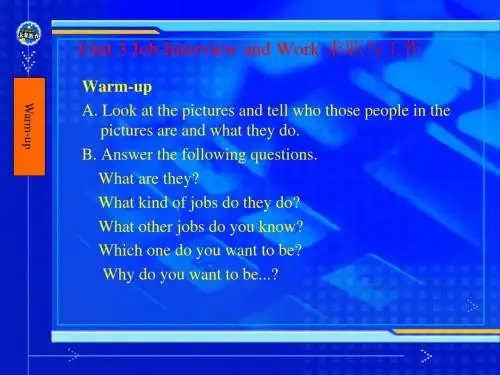
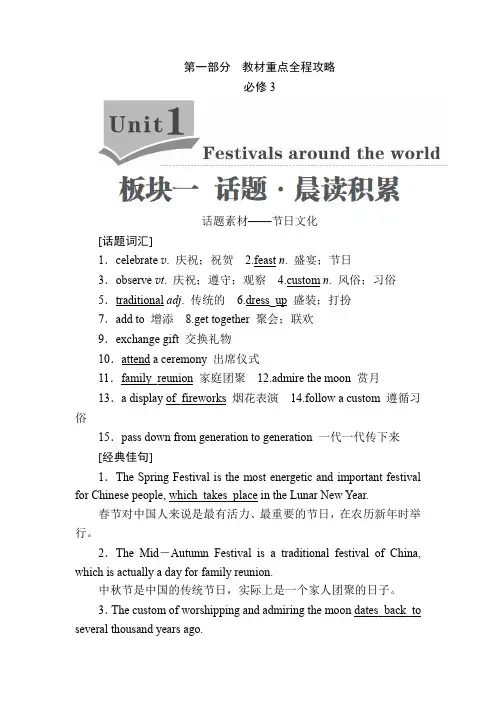
第一部分教材重点全程攻略必修3话题素材——节日文化[话题词汇]1.celebrate v. 庆祝;祝贺 2.feast n. 盛宴;节日3.observe v t. 庆祝;遵守;观察 4.custom n. 风俗;习俗5.traditional adj. 传统的 6.dress_up 盛装;打扮7.add to 增添8.get together 聚会;联欢9.exchange gift 交换礼物10.attend a ceremony 出席仪式11.family_reunion 家庭团聚12.admire the moon 赏月13.a display of_fireworks 烟花表演14.follow a custom 遵循习俗15.pass down from generation to generation 一代一代传下来[经典佳句]1.The Spring Festival is the most energetic and important festival for Chinese people, which_takes_place in the Lunar New Year.春节对中国人来说是最有活力、最重要的节日,在农历新年时举行。
2.The Mid-Autumn Festival is a traditional festival of China, which is actually a day for family reunion.中秋节是中国的传统节日,实际上是一个家人团聚的日子。
3.The custom of worshipping and admiring the moon dates_back_to several thousand years ago.祭月赏月的风俗追溯到几千年前。
精美语篇The Mid-Autumn FestivalThe Mid-Autumn Festival falls on the 15th of the eighth month of our Chinese lunar calendar. As one of the traditional Chinese festivals, it has been enjoying great popularity in our country. Usually, no matter how far or how busy we are, we will manage to come home for the celebration. The moon that night looks the brightest in the whole lunar month. What we love most is when we enjoy the full moon together. With the beautiful moon high up in the sky, we sit together, eating mooncakes and fruit and sharing our stories. In addition to these traditional activities, we have a wider range of choices such as travelling or visiting our relatives or friends.◆高频单词1.beauty (n.) 美;美人→beautiful (adj.) 美丽的;漂亮的→beautify (v t.) 美化;使更美丽2.celebration (n.) 庆祝;祝贺→celebrate (v t.& v i.) 庆祝;祝贺3.starve (v i. & v t.) (使)饿死;饿得要死→starvation (n.) 饿死;挨饿4.origin (n.) 起源;由来;起因→original (adj.) 原来的;独创的→originate (v.) 起源于;产生5.religious (adj.) 宗教上的;信奉宗教的;虔诚的→religion (n.) 宗教(信仰)6.belief (n.) 信任;信心;信仰→believe (v t.) 相信7.arrival (n.) 到来;到达;到达者→arrive (v t.) 到达;赶到8.gain (v t.) 获得;得到(n.) 利润;获益9.independence (n.) 独立;自主→independent (adj.) 独立的;自主的→depend (v.) 依赖;依靠10.gather (v t. & v i.) 搜集;集合;聚集→gathering (n.) 聚集;聚会;集会11.agriculture (n.) 农业;农艺;农学→agricultural (adj.) 农业的;农艺的12.award (n.) 奖;奖品(v t.) 授予;判定13.admire (v t.) 赞美;钦佩;羡慕→admiration (n.) 钦佩;羡慕14.energetic (adj.) 充满活力的;精力充沛的;积极的→energy (n.) 精力;能量15.custom (n.) 习惯;风俗→customer (n.) 顾客→customs (n.) 海关16.fool (n.) 愚人;白痴;受骗者(v t.) 欺骗;愚弄→foolish (adj.) 愚蠢的;傻的17.permission (n.) 许可;允许→permit (v t.) 允许18.apologize (v i.) 道歉;辩白→apology (n.) 道歉19.sadness (n.) 悲伤;悲哀→sad (adj.) 悲哀的;难过的20.obvious (adj.) 明显的;显而易见的→obviously (ad v.) 明显地;显而易见地21.remind (v t.) 提醒;使想起→reminder (n.) 引起回忆的事物22.forgive (v t.) 原谅;饶恕→forgiveness (n.) 宽恕;原谅◆重点短语1.take_place 发生2.do harm to 对……有害3.in memory of 纪念;追念4.dress_up 穿上盛装;打扮;装饰5.play_a_trick_on 搞恶作剧;诈骗;开玩笑6.look_forward_to 期望;期待;盼望7.day and night 日夜;昼夜;整天8.as though/if 好像9.have fun with 和……玩得开心10.turn up 出现;到场11.keep one's word 守信用;履行诺言12.hold one's breath 屏息;屏气13.set off 出发;动身;使爆炸14.remind ... of ... 使……想起……◆热点句型1.“be+形容词+to do ...”结构At that time people would starve if food was_difficult_to_find (难以找到),especially during the cold winter months. (教材P1)2.either ... or ... “或者……或者……”Some festivals are held to honour the dead or to satisfy the ancestors, who might return either_to_help_or_to_do_harm (提供帮助或带来危害). (教材P2)3.“with+宾语+介词短语”结构On this important feast day, people eat food in the shape of skulls and cakes with_“bones”_on_them (上面有“骨头”). (教材P2) 4.when引导的非限制性定语从句China and Japan have mid-autumn festivals, when_people_admire_the_moon_ (这时人们会赏月) and in China, enjoy mooncakes. (教材P2)5.it作形式主语的主语从句It_was_obvious_that (很明显) the manager of the coffee shop was waiting for Li Fang to leave ... (教材P7)6.while引导的时间状语从句While_she_was_on_earth (她在人间时) she met the herd boy Niulang and they fell in love. (教材P7)◆同步训练在空白处填入1个适当的单词或括号内单词的正确形式。
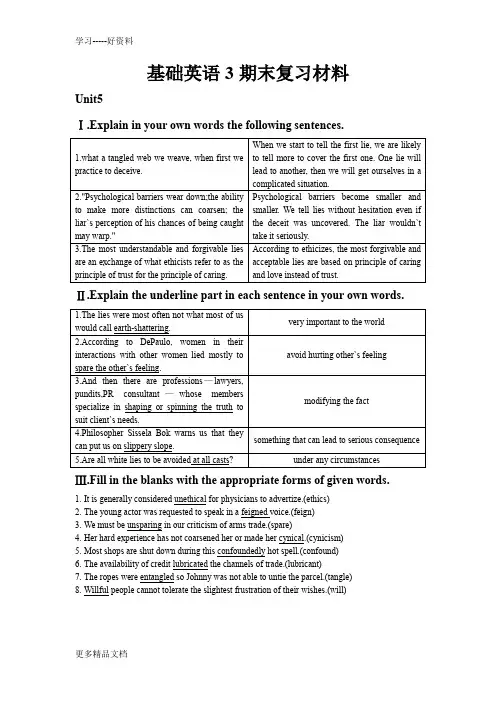
基础英语3期末复习材料Unit5Ⅰ.Explain in your own words the following sentences.1.what a tangled web we weave, when first we practice to deceive. When we start to tell the first lie, we are likely to tell more to cover the first one. One lie will lead to another, then we will get ourselves in a complicated situation.2."Psychological barriers wear down;the ability to make more distinctions can coarsen; the liar`s perception of his chances of being caught may warp." Psychological barriers become smaller and smaller. We tell lies without hesitation even if the deceit was uncovered. The liar wouldn`t take it seriously.3.The most understandable and forgivable lies are an exchange of what ethicists refer to as the principle of trust for the principle of caring. According to ethicizes, the most forgivable and acceptable lies are based on principle of caring and love instead of trust.Ⅱ.Explain the underline part in each sentence in your own words.1.The lies were most often not what most of uswould call earth-shattering.very important to the world2.According to DePaulo, women in theirinteractions with other women lied mostly tospare the other`s feeling.avoid hurting other`s feeling3.And then there are professions—lawyers,pundits,PR consultant—whose membersspecialize in shaping or spinning the truth tosuit client`s needs.modifying the fact4.Philosopher Sissela Bok warns us that theycan put us on slippery slope.something that can lead to serious consequence 5.Are all white lies to be avoided at all casts? under any circumstancesⅢ.Fill in the blanks with the appropriate forms of given words.1.It is generally considered unethical for physicians to advertize.(ethics)2.The young actor was requested to speak in a feigned voice.(feign)3.We must be unsparing in our criticism of arms trade.(spare)4.Her hard experience has not coarsened her or made her cynical.(cynicism)5.Most shops are shut down during this confoundedly hot spell.(confound)6.The availability of credit lubricated the channels of trade.(lubricant)7.The ropes were entangled so Johnny was not able to untie the parcel.(tangle)8.Willful people cannot tolerate the slightest frustration of their wishes.(will)Ⅳ.Explain the underlined phrasal verbs in your own words.1. The outdoor concert was called off due to thecanceledweather.2.The expanded vocabulary,as well as theimproved reading speed and accuracy, will be aovercomerecord that can encourage you to get over theboredom.3.They knew that any failure to abide by thefollowterms of the treaty would bring internationalcondemnation.4.He was reduced to begging in the streets offell intoManhattan.5.The plain fact is that they are giving me themake it more acceptablesake,however they try to dress it up.6.The secret is not to brood over your failures,care aboutbut ta accept them as inevitable.7.The option of increasing investment has beenruled out. given up8.It is wise to set food and money by in case ofreserve for future usea future emergency.Ⅴ.Translate English to Chinese.1.Most strikingly, these tellers-of-a-thousand-lies reported that their deceptions caused them "little preoccupation or regret."十分惊人的是,这些无数次说谎的人称,说谎并没有是他们十分纠结或者后悔。

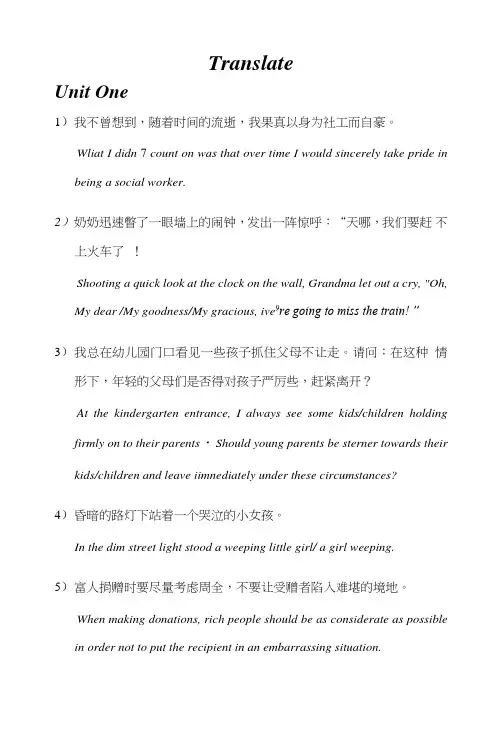
TranslateUnit One1)我不曾想到,随着时间的流逝,我果真以身为社工而自豪。
Wliat I didn 7 count on was that over time I would sincerely take pride in being a social worker.2)奶奶迅速瞥了一眼墙上的闹钟,发出一阵惊呼:“天哪,我们要赶不上火车了!Shooting a quick look at the clock on the wall, Grandma let out a cry, "Oh, My dear /My goodness/My gracious, ive9re going to miss the train! ”3)我总在幼儿园门口看见一些孩子抓住父母不让走。
请问:在这种情形下,年轻的父母们是否得对孩子严厉些,赶紧离开?At the kindergarten entrance, I always see some kids/children holding firmly on to their parents・ Should young parents be sterner towards their kids/children and leave iimnediately under these circumstances?4)昏暗的路灯下站着一个哭泣的小女孩。
In the dim street light stood a weeping little girl/ a girl weeping.5)富人捐赠时要尽量考虑周全,不要让受赠者陷入难堪的境地。
When making donations, rich people should be as considerate as possible in order not to put the recipient in an embarrassing situation.6)从上个月起,我的工作就是围绕日常办公事务转,所以现在每天掰着指头算什么时候才到国庆节:我和朋友们要去乡下远足呢!Since last month, my work has been revolving around the routine office duties, so now I am counting the days imtil the National Day comes, when my fiiends and I are going hiking in the countiyside.Unit TwoJ)无论是友情还是爱情,你都不可能期待自己付出最少而获得最多。
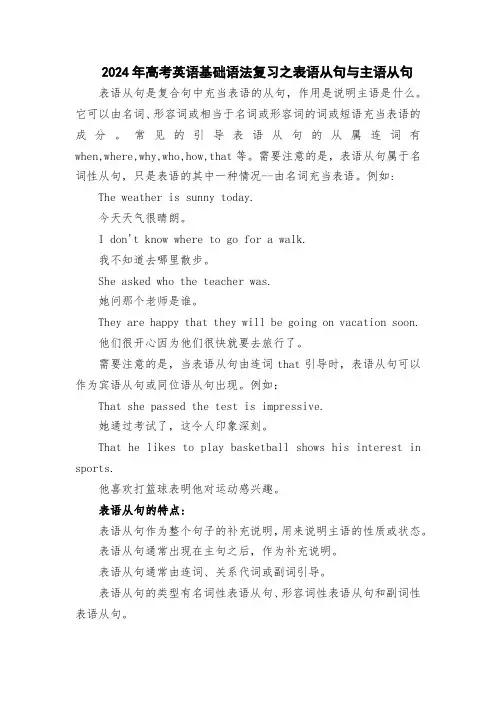
2024年高考英语基础语法复习之表语从句与主语从句表语从句是复合句中充当表语的从句,作用是说明主语是什么。
它可以由名词、形容词或相当于名词或形容词的词或短语充当表语的成分。
常见的引导表语从句的从属连词有when,where,why,who,how,that等。
需要注意的是,表语从句属于名词性从句,只是表语的其中一种情况--由名词充当表语。
例如: The weather is sunny today.今天天气很晴朗。
I don't know where to go for a walk.我不知道去哪里散步。
She asked who the teacher was.她问那个老师是谁。
They are happy that they will be going on vacation soon.他们很开心因为他们很快就要去旅行了。
需要注意的是,当表语从句由连词that引导时,表语从句可以作为宾语从句或同位语从句出现。
例如:That she passed the test is impressive.她通过考试了,这令人印象深刻。
That he likes to play basketball shows his interest in sports.他喜欢打篮球表明他对运动感兴趣。
表语从句的特点:表语从句作为整个句子的补充说明,用来说明主语的性质或状态。
表语从句通常出现在主句之后,作为补充说明。
表语从句通常由连词、关系代词或副词引导。
表语从句的类型有名词性表语从句、形容词性表语从句和副词性表语从句。
表语从句在句子中起到谓语的作用,用来表示主语的性质或状态。
表语从句有哪些常见的应用场景?表语从句在英语语法中起着重要的作用,它可以用来说明主语的性质或状态。
表语从句常见的应用场景包括:当主语是抽象名词时,如love, friendship等,这时需要通过表语从句来进一步说明主语的含义。
例如:The love between parents and children is unique. (父母与孩子之间的爱是独特的。
Unit 3李仕才一、词汇讲解1. stubborn adj. 顽固的,固执的;顽强的或有决心的;坚持的;棘手的比较级: stubborner 最高级: stubbornest【派生词】stubbornly adv. 倔强地,顽强地,顽固地【派生词】stubbornness noun [U] 倔强,顽强;牛性;牛脾气;犟劲anizev. 组织;安排;规划;建立组织【派生词】organizer-isern.组织者,编制者,发起人;[生]形成体;〈口〉公文柜,(分类记事的)备忘记事簿;[计]整理器【派生词】organization n. 组织;机构;团体;【派生词】organizational adj. 组织的;编制的3.determinevt.& vi.(使)下决心,(使)做出决定(~ on sth/to do sth 决定,决心(做某事) )vt. 决定,确定;判定,判决;使决定;限定vi. [主用于法律]了结,终止,结束【派生词】determination n. 决心;决定,确定;[物]测定,计算【派生词】determinedadj. 确定的;坚定的;毅然的v. 确定;决定;(使)下决心,(使)做出决定( determine 的过去式和过去分词);使决定【派生词】determinedly adv. 坚决地;坚定地;断然地;决然地4.journey (Journey to the West 西游记 )n. 旅行,旅程行期;历程,过程vi. 旅行,出游vt. 在…旅行或旅行到过…【近义词辩词】1) journey 指经由陆路、空路或海路,从一地到另一地的旅程,如:a journey of over 2, 000miles (2, 000 多英里的旅程)。
表示旅行到某个地方用 journey,这是文雅的用法:The nights became colder as they journeyed north(他们北上的过程中,夜晚变得越来越冷)。
【高三】2021年高考英语知识点必修三Module 3单元总复习教案知识详解1 experience n.[C](一次)经历,体验;[U]经验;阅历vt. 经受,体验,感受(回归课本P21)Have you ever experienced a flood?你曾经经历过洪灾吗?归纳have much teaching/working experience教学/工作经验丰富,by/from experience 凭经验;从经验中(得出),in one’s experience据某人的经验看,experience in/of 在……方面的经验,experienced adj.有经验的,熟练的,be experienced in在……方面有经验例句探源①Children need to experience things for themselves in orde r to learn from them.孩子们要学习新鲜东西就需要亲身经历它们。
②(高考大纲全国卷Ⅱ)You will have your choice between hot or cold rooms,but you will be well advised to stay at least one night in a cold room for a true experience.你可以在冷房子和热房子之间选择,但是你会被奉劝在冷房子里至少住一夜,做一次真实的体验。
③In my experience,these things never last very long.从我的经验来看,这些事情从未长久过。
④He had no experience of managing a farm.他没有管理农场的经验。
即境活用1.He is________as a leader but he doesn’t have ________in teaching.A.success;many experienceB.a success;much experienceC.success;an experienceD.success;a lot of experiences解析:选B。
基础英语3期末复习材料Unit5Ⅰ.Explain in your own words the following sentences.Ⅱ.Explain the underline part in each sentence in your own words.Ⅲ.Fill in the blanks with the appropriate forms of given words.1.It is generally considered unethical for physicians to advertize.(ethics)2.The young actor was requested to speak in a feigned voice.(feign)3.We must be unsparing in our criticism of arms trade.(spare)4.Her hard experience has not coarsened her or made her cynical.(cynicism)5.Most shops are shut down during this confoundedly hot spell.(confound)6.The availability of credit lubricated the channels of trade.(lubricant)7.The ropes were entangled so Johnny was not able to untie the parcel.(tangle)8.Willful people cannot tolerate the slightest frustration of their wishes.(will)Ⅳ.Explain the underlined phrasal verbs in your own words.Ⅴ.Translate English to Chinese.1.Most strikingly, these tellers-of-a-thousand-lies reported that their deceptions caused them "little preoccupation or regret."十分惊人的是,这些无数次说谎的人称,说谎并没有是他们十分纠结或者后悔。
2.Despite these admission, 91percent of all respondents said they were "satisfied with my own ethics and character."尽管承认说谎,91%的反馈者称“对自己的道德和性格还是感到满意。
”3.Surely, these "nice lies"are harmless and well-intended, a necessary social lubricant.这些善意的谎言无疑是好意的,也是社会必要的润滑剂。
4.And if you`re not sure, Mark Twain has given us a good rule of thumb. "When in doubt, tell the truth. It will confound your enemies and astound your friends."如果你没有把握,马克吐温给了我们一条经验法则“拿不准的时候就说实话,这会使迷惑敌人,震惊朋友。
”Ⅵ.Translate Chinese into English.1、当哈姆雷特拿不定主意该采取什么行动时,他就装疯(feign)Hamlet feigned madness when he was hesitating about what to do.2、搪塞推诿是这生意人的惯用伎俩(prevarication)Prevarication is one of the techniques this businessman likes to employ.3、真理之光有时太刺目,于是善意的谎言随处可见(ubiquitous)Sometimes the light of the truth is just too dazzling, so white lies are ubiquitous.4、美国许多妇女声称他们对自己二等公民的地位感到不满(profess)Many women in America profess that they are unhappy with their status as second-class citizens. 5、一时冲动之下,他失言抖出了秘密(blurt out)On the impulse of the moment, he blurted out the secret.6、你应该摆脱偏见,抵制诱惑,不让任何东西扭曲你的判断(warp)You should get rid of any prejudice, resist temptations and let nothing warp your judgment.7、他是一个过于敏感和富于想象的人,经常在头脑里编织一张复杂的网络(a tangled web)Being over-sensitive and imaginative, he often weaves a tangled web in his mind.8、他在伙伴中很受欢迎,因为他尽量不给别人添麻烦(spare)He is very popular among his peers as he always tries to spare others any trouble.Unit8Ⅰ.Explain in your own words the following sentences.Ⅱ.Explain the underline part in each sentence in your own words.Ⅲ.Fill in the blanks with the appropriate forms of given words.1.The main beneficiaries of the Hope Project are poverty-stricken children living in remote areas,(benefit)2.Traditional herbal medicine is said to have less undesirable said effects.(desire)3.The cold wind drove the snow almost horizontally at the soldiers marching in the wilderness.(horizon)4.American Indians are now proud to be the descendants of North America`s first inhabitants.(descend)5.The southern regions have increasingly relied on foreign investment(increase)6.This philosophical essay is beyond my daughter`s capacity.(philosophy)7.Calm down! Let`s not be unduly worried.(due)8.In test theory, standardization refers to measurements or assessments conducted under exact specified, and repeatable condition.(standard)Ⅳ.Explain the underlined phrasal verbs in your own words.Ⅴ.Translate English to Chinese.1.Most people would agree that, although our age far surpasses all previous ages in knowledge, there has been no correlative in wisdom.大多数人或许都会同意,虽然我们所处的时代在知识积累方面远远超过以往任何时代,但在智慧方面却没有相应的增长.2.This has the entirely unintended result of making the food supply inadequate and lowering the standard of life in the most populous parts of the world.它产生了完全出人意料的后果,即在世界上人口最为稠密的地区,食品供应短缺,生活水平下降.3.It is by no means uncommon to find men whose knowledge is wide but whose feeling are narrow.有些人知识渊博而情感狭隘,这绝不少见.4.No one can view the world with complete impartiality; and if anyone could, he would hardly be able to remain alive.没有人能够毫无偏见地看待世界,若有的话,他将难以活下去.Ⅵ.Translate Chinese into English.1.实验结果远远超出了他们的预料(surpass)The result of the experiment far surpassed their expectations.2.我们应该充分考虑这个项目的费用和可能遇到的问题(take account of)We should take full account of the cost of the project and the difficulties we may meet.3.好天气是这次远征科学考察成功的原因之一(contribute to)The fine weather contributed to the success of the scientific expedition.4.巴西球员球星罗纳尔多(Ronaldo)在2002年世界杯足球赛中射进好几个精彩的球(spectacular)Ronaldo, one of the football stars from Brail, scored several spectacular goals in the 2002 World Cup.5.罗伯特•弗罗斯特(Robert Frost)由于对诗歌的杰出贡献被美国许多大学授予名誉学位(confer…upon)Many honorary degrees from different colleges and universities in America were conferred upon Robert Frost for his great contributions to poetry.6.摆脱坏习惯需要耐心和毅力(emancipation from…)Patience and perseverance are required in emancipation from bad habits.7.他们努力将这些新观念灌输到学生的头脑中去(instill)They tried to instill such new ideas into students’ minds.8.你对员工进行评估时应该做到公正(impartiality)You should show impartiality in your assessment of the employees.Unit11Ⅰ.Explain in your own words the following sentences.Ⅱ.Explain the underline part in each sentence in your own words.Ⅲ.Fill in the blanks with the appropriate forms of given words.1.He failed to give substantial reasons for his being absent from the meeting.(substance)2.Driven by very strong motivation, he nas been working hard at English.(motivate)3.He has been fully committed to the teaching and research of classical music.(commitment)4.The club places rigid restrictions on its membership.(restrictive)5.There is a subtle difference between "egoism" and "individualism".(subtlety)6.A cuckoo bird`s voice is so thrilling in winter, as it announces the advent of springtime.(thill)7.He dislikes his wife talking about her success complacently.(complacency)8.The early 1990`s witnessed a(n) unprecedented tide of rural workers flooding into big cities in China.(precedence)Ⅳ.Explain the underlined phrasal verbs in your own words.Ⅴ.Translate English to Chinese.1.We may even have expectations that they be endless repositories of skill and knowledge from which we may partake at will.我们甚至可能期望他们是技能与知识的宝库,取之不尽,我们可以随意享用。